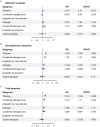Menopausal hormone therapy and risk of dementia: health insurance database in South Korea-based retrospective cohort study
- PMID: 37744387
- PMCID: PMC10512830
- DOI: 10.3389/fnagi.2023.1213481
Menopausal hormone therapy and risk of dementia: health insurance database in South Korea-based retrospective cohort study
Abstract
Introduction: Menopausal hormone therapy (MHT) is used to alleviate the symptoms associated with menopause, despite the lack of recommendations for MHT in preventing dementia. Recent nationwide studies have explored the association between MHT and dementia risk, but the findings remain limited. This study aims to investigate the association between MHT and the incidence of Alzheimer's disease (AD) and non-AD dementia using national population data from Korea.
Methods: We conducted a retrospective study using data from the National Health Insurance Service in Korea between January 1, 2002, and December 31, 2019. Women over 40 years were eligible for this study and classified into the MHT or non-MHT groups. The MHT group consisted of women who used Tibolone (TIB), combined estrogen plus progestin by the manufacturer (CEPM), estrogen, combined estrogen plus progestin by a physician (CEPP), and transdermal estrogen during menopause. We compared the risk of dementia between the MHT and non-MHT groups.
Results: The study included 1,399,256 patients, of whom 387,477 were in the MHT group, and 1,011,779 were in the non-MHT group. The median duration of MHT was 23 months (range: 10-55 months). After adjusting for available confounders, we found that different types of MHT had varying effects on the occurrence of dementia. TIB (HR 1.041, 95% confidence interval (CI) 1.01-1.072) and oral estrogen alone (HR 1.081, 95% CI 1.03-1.134) were associated with a higher risk of AD dementia. In contrast, there was no difference in the risk of AD dementia by CEPM (HR 0.975, 95% CI 0.93-1.019), CEPP (HR 1.131, 95% CI 0.997-1.283), and transdermal estrogen (HR 0.989, 95% CI 0.757-1.292) use. The use of TIB, CEPM, and oral estrogen alone increased the risk of non-AD dementia (HR 1.335, 95% CI 1.303-1.368; HR 1.25, 95% CI 1.21-1.292; and HR 1.128, 95% CI 1.079-1.179; respectively), but there was no risk of non-AD dementia in the other MHT groups (CEPP and topical estrogen).
Conclusion: Our findings indicate that MHT has varying effects on the incidence of AD and non-AD dementia. Specifically, TIB, CEPM, and oral estrogen alone increase the risk of non-AD dementia, while transdermal estrogen is not associated with dementia risk. It is essential to consider the type of MHT used when assessing the risk of dementia in women.
Keywords: dementia; menopausal hormone therapy; menopause; tibolone; women.
Copyright © 2023 Yuk, Lee and Park.
Conflict of interest statement
The authors declare that the research was conducted in the absence of any commercial or financial relationships that could be construed as a potential conflict of interest.
Figures


Similar articles
-
Breast cancer risk association with postmenopausal hormone therapy: Health Insurance Database in South Korea-based cohort study.Eur J Endocrinol. 2024 Jan 3;190(1):1-11. doi: 10.1093/ejendo/lvad168. Eur J Endocrinol. 2024. PMID: 38128117
-
Menopausal hormone therapy increases the risk of gallstones: Health Insurance Database in South Korea (HISK)-based cohort study.PLoS One. 2023 Dec 4;18(12):e0294356. doi: 10.1371/journal.pone.0294356. eCollection 2023. PLoS One. 2023. PMID: 38048308 Free PMC article.
-
Menopausal hormone therapy and the risk of type 2 diabetes mellitus: Health Insurance Database in South Korea-based retrospective cohort study.Menopause. 2023 May 1;30(5):497-505. doi: 10.1097/GME.0000000000002170. Epub 2023 Mar 12. Menopause. 2023. PMID: 36917757
-
Cognitive health after menopause: Does menopausal hormone therapy affect it?Best Pract Res Clin Endocrinol Metab. 2021 Dec;35(6):101565. doi: 10.1016/j.beem.2021.101565. Epub 2021 Aug 17. Best Pract Res Clin Endocrinol Metab. 2021. PMID: 34538724 Review.
-
Update: estrogen and estrogen plus progestin therapy in the care of women at and after the menopause.Womens Health (Lond). 2012 Mar;8(2):169-89. doi: 10.2217/whe.12.1. Womens Health (Lond). 2012. PMID: 22375720 Review.
Cited by
-
Antidepressant Effect of Enzymatic Porcine Placenta Hydrolysate in Repeated Immobilization Stress-Induced Ovariectomized Female Mice.Curr Issues Mol Biol. 2024 Jun 17;46(6):6121-6138. doi: 10.3390/cimb46060366. Curr Issues Mol Biol. 2024. PMID: 38921037 Free PMC article.
References
-
- Bolormaa E., Choe S. A., Son M., Ki M., Paek D. (2022). Income-based disparities in the risk of distant-stage cervical cancer and 5-year mortality after the introduction of a National Cancer Screening Program in Korea. Epidemiol. Health 44:e2022066. doi: 10.4178/epih.e2022066, PMID: - DOI - PMC - PubMed
-
- Bushnell C., McCullough L. D., Awad I. A., Chireau M. V., Fedder W. N., Furie K. L., et al. . (2014). Guidelines for the prevention of stroke in women: a statement for healthcare professionals from the American Heart Association/American Stroke Association. Stroke 45, 1545–1588. doi: 10.1161/01.str.0000442009.06663.48, PMID: - DOI - PMC - PubMed
LinkOut - more resources
Full Text Sources

